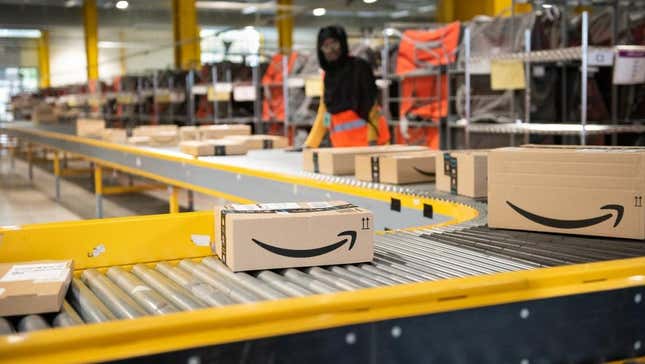
Amazon is reportedly responsible for more injuries than previously thought, according to a new study published Wednesday. The retail giant employs one of the largest warehouse workforces in the U.S., boasting of more than 700,000 people, but recent investigations question the safety and health of those employees.
Researchers found a shocking 41% of employees reported being injured while on the job, while 69% of workers had to take unpaid leave because of pain or exhaustion from working at an Amazon warehouse . The study surveyed 1,484 frontline Amazon warehouse workers across 451 facilities and 42 states.
In recent months, the Occupational Safety and Health Administration (OSHA), the Department of Justice, and the Senate Committee on Health, Education, Labor, and Pensions launched investigations into Amazon’s health and safety practices across the country.
“We undertook this study because media reports and government agency investigations have raised serious questions about working conditions at Amazon warehouses,” Dr. Beth Gutelius, a co-author of the report, said in a press release. “The survey data indicate that how Amazon designs its processes–including extensive monitoring and the rapid pace of work–is contributing to a considerable physical and mental health toll, including injuries, burnout, and exhaustion.”
An Amazon spokesperson took issue with the results of the study, including referring to it as a “study.”
“If anyone actually wants to know the facts, they can read the data that we publish each year and submit to OSHA, which shows that rates in our buildings have improved significantly and we’re slightly above the average in some areas and slightly below the average in others,” said Amazon spokesperson Maureen Lynch Vogel in an email Wednesday. “While we’re proud of the significant progress we’ve made, we don’t want to be just average – there’s nothing more important than our employees’ health and safety and we’ll continue to invest in safety across our network as we work to keep getting better every day.”
Warehouses account for the majority of workplace injuries, with an injury rate of 5.5 per 100 workers, the study noted. These findings revealed that it more than doubles the injury rate in other industries including construction, coal mining, and most manufacturing industries.
The majority of warehouse injuries are caused by “overexertion and repetitive motion; slips, trips, and falls; and being hit by objects such as boxes,” according to the study. “Injury risks in warehouses can also be exacerbated by inadequate recovery time and the inability of workers to take breaks when they need to rest, as exhaustion and fatigue have been proven to lead to higher rates of injury.”
Gutelius and her co-author, Dr. Sanjay Pinto, say their findings showed that 78% of Amazon warehouse workers feel pressured by the company to work faster, thus experiencing burnout which can result in an increased risk of injury. Of those surveyed, the findings also revealed that 60% of the employees said they are monitored more at Amazon than at any previous jobs.
“Amazon has been heralded as a quintessential ‘innovator,’ reshaping norms and practices in the warehousing industry and the economy more broadly,” Gutelius and Pinto wrote in the press release. “But our survey data suggest that its drive towards ever-greater speed and efficiency carries significant costs that are being displaced onto its workforce.”
The study follows a report in April showing similar findings, but an Amazon spokesperson told CNBC at the time that the findings “paint an inaccurate picture” of the company’s warehouse working conditions.